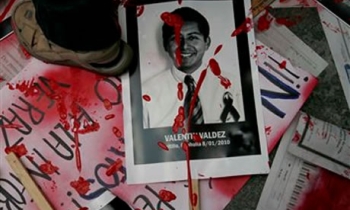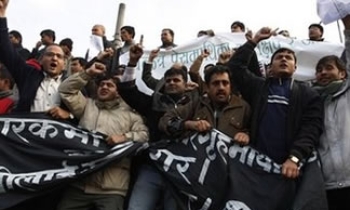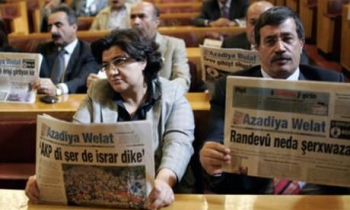Located on the first-floor of a condominium in suburban Delhi, the serpent’s lair is conspicuous by its inconspicuousness. No nameplate or fancy decoratives adorn the front door. A secretary answers the bell and leads visitors into a spartan drawing room. "Sir will be here in a while," he says in a mechanical tone. The flat has had more than its share of visitors of late – at least his voice indicates so.
Minutes later, Aniruddha Bahal, editor of the online news portal Cobrapost, walks in. Complacency is writ large on his face, in stark contrast to the mayhem that currently grips the Indian Parliament, its pillars rattled by Operation Duryodhana, a sting operation executed jointly by Cobrapost and the news channel Aaj Tak. It’s not the first time that the serpent has spewed venom.
"It was difficult to get going, since we began working on a clean slate," says Bahal. "In fact, when I started working on this, I didn’t even know whether I had a story," he says.
Serpents are not quite olfactorily challenged. And Bahal’s nose for news has been no exception to that norm. "Aniruddha has always been driven by the big story," says Tehelka boss and former colleague Tarun Tejpal. "And time and again, he had displayed great ingenuity and courage to get to the bottom of the truth, which is a trait that sets him apart from others."
Indeed, it was his passion for the big story that took Bahal through the corridors of politics, spotting the odd MP that he thought would be willing to ask questions in Parliament in return for a wad of bank notes. It was not just risky, but expensive to boot. Bahal is said to have poured lakhs into the job, but is unwilling to say how much. The money, he says, came either from his own pocket or from his friends.
For the alumnus of St Joseph’s College, Allahabad, who took a plunge in the world of news mongering in 1991, the operation is the latest in a series of exposés that he has executed. The UP-ite worked mostly in news magazines before pooling in resources with Tejpal to start Tehelka, a website-cum-news magazine that would eventually go on to redefine the concept of investigative journalism in India.
That was in 2000, and the media revolution had brought with it a whole range of electronic gadgets for the benefit of the investigative journalist. Needless to say, Bahal took full advantage of it. "If used well, tiny lens-bearing apertures can empower a citizenry by exposing democracy’s toxic average," says Bahal.
Bahal soon went on to prove that match fixing in cricket did exist and that defence personnel had no qualms about being on the take. Even before he parted ways with Tejpal to start Cobrapost in 2003 – which was also the year he wrote his thriller Bunker 13 and subsequently earned himself a bad sex’ award –Bahal had made his mark for his ways with a hidden camera.
Blowing the lid off the parliamentary cash-for-questions racket, however, was an operation that, he says, came about by chance. It was while criticising the sting operation carried out by a news channel on Bollywood’s casting couch in March that Bahal floated the idea of an operation on greasy-palmed MPs. And then he decided to follow up his words by actually delving into the cartel that previously existed only in the domain of hearsay.
Bahal decided to masquerade as a representative of the fictitious North Indian Small Manufacturers’ Association (NISMA) and offer money to MPs for asking questions. "But we didn’t know whom to approach, so we had to do several rounds in the offices and cultivate our sources before we got in touch with a few middlemen in the ranks who would eventually lead us to the members," he says.
One contact led to another, and after nine months of hard work, Bahal had filmed 13 MPs negotiating over money to be paid by NISMA representatives. "One MP rejected our offer, and another was trodding the grey area, so we let him be."
Once the footage had been taken, Bahal spoke to some news channels and a deal was finally struck with Aaj Tak. Rumour has it that he has made quite a packet, but Bahal isn’t willing to disclose how much. "Let’s say it took care of all my expenses and legal security, and paid me a token remuneration for my efforts. And of course, (Lok Sabha speaker) Somnath Chatterjee gifted me a pen. I think it’s a Sheaffer," he smiles.
But even as Bahal basks in the glory of his feat, it has, as expected, renewed the old debate on journalistic ethics. "It’s justified if the story were such that tremendous public interest would be served by it," is Bahal’s take on the issue. And media analyst Shubhra Gupta would agree, but only somewhat. "Sting operations have come as a fresh boost to old-fashioned investigative journalism," she says. "But what is important is how far one would go to get what one thinks is the truth. That’s when acts such as posing as a briber to frame a person become questionable. Maybe that’s the future of investigative journalism. But all said, it’s still a sneaky thing to do."
Sneaky or not, a sting bites. And Bahal has proved it yet again. And now that hell has frozen over, the king of sting says he would sit back and wait for the commotion to wane. "I’m just going to wait and watch," he says.
Which effectively means it’s time for the serpent to go into hibernation. Till it wakes up once again, that is.









